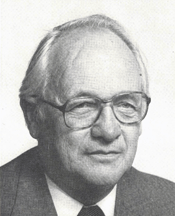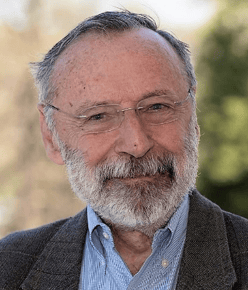
Philip D. Curtin
Philip D. Curtin, a key founder of both African studies in the United States and the broader perspectives that are now maturing as “world history,” passed away on June 4, 2009, in West Chester, Pennsylvania.
Curtin was born in Philadelphia on May 22, 1922, but was raised from infancy in central West Virginia. He returned to the Philadelphia area for his last years of high school and his undergraduate education (Swarthmore, BA 1948, interrupted from 1943 to 1946 for wartime service as a radio officer in the U.S. Merchant Marine). After receiving his PhD in British imperial history from Harvard in 1953, he began a 45-year career of innovative teaching, research, program building, and graduate training at his alma mater, Swarthmore College.
Curtin’s 19 edited, co-authored, and authored books began with his Harvard dissertation, Two Jamaicas (Harvard Univ. Press, 1955, republished by Randle in Jamaica, 1998), which reversed the usual vector of the field to explore Jamaican perspectives on British imperialism. In 1956 he moved from Swarthmore to the University of Wisconsin at Madison, where he taught Latin American history, introduced the then barely nascent field of African history, and recruited an international array of Africanists to build a noted program in African studies, aided—among others—by his history colleague, Jan Vansina. They created the nation’s first department of African Languages and Literatures in 1961. His second monograph, The Image of Africa (Univ. of Wisconsin Press, 1965), trained his eye for intellectual history on critiquing the large corpus of potential British sources for Africa’s history. In a similar spirit of laying intellectual groundwork for a new field, he went on to edit a collection of enslaved Africans’ own memories—including those of the subsequently famed Olaudah Equiano—of their home backgrounds, with introductions from specialists in the regions from which they had come (Africa Remembered, 1967).
At the same time, Curtin became a defining source of the then also nascent movement to create a vision of the world’s history less Eurocentric than the progressivism prevailing in the profession. At Wisconsin he combined the new regional fields—from the Incas to Indonesia—into a graduate program in comparative tropical history. From 1966 to 1975 he and his colleagues awarded some sixty or so PhDs in the relevant regional fields (more than forty of them to Africanists), bestowing on the discipline the cohort at the core of the World History Association founded in 1971. Curtin’s comparative approach to historical patterns recurring on global scales—plantations, “cross cultural trade,” human migrations and their often lethal epidemiological consequences—became the hallmark of his research after moving to the Johns Hopkins University in 1975 (as Herbert Baxter Adams Professor from 1982).
Curtin’s characteristic thoroughness, combined with a devotion to methodological rigor that shaped profoundly both his students and his colleagues, led him to count the Census of the Atlantic slave trade (Univ. of Wisconsin Press, 1969) that became both his most enduring legacy and, in the charged cultural politics of the 1970s, a persisting focus of controversies. In drafting his exemplary economic history of western Africa, Economic Change in Precolonial Africa (2 vols., Univ. of Wisconsin Press, 1975), he had wished to place the numbers of people embarked from the region in the context of the total number of those whom Europeans had purchased; the planned footnote turned into a cautious monograph bringing his skills in the histories of Europe, Africa, and the Americas and a critical sense for what he called “the numbers game” together to reach a considered estimate on the order of 10,000,000. This cautious proposal became a lightning rod for historians and even politicians on all the continents involved, with some seeking indications that the (published) records Curtin had consulted systematically obscured the real, higher, figure; the more scholarly withheld judgment while digging into an expanding set of archives to recover primary, unpublished data. After nearly four decades of work, an international team of researchers led by David Eltis (Emory Univ.) assembled the results of this work in an online database including all known information on more than 80% of the individual ships carrying enslaved Africans; so far their work confirms Curtin’s original overall estimate, well within the range of error he affirmed, though adding many refinements, and some modest adjustments, in detail.
Curtin’s dedication to exhaustive research and rigorous methodologies, often in fields highly charged by the cultural politics of his era, won him numerous positions of professional responsibility, some of them on occasion requiring great personal courage to execute. He served as president of the African Studies Association in 1971, at a moment of wrenching turmoil in the organization. He was elected a fellow of the American Academy of Arts and Sciences in 1975 and served on all of the major organizing bodies behind African studies, including the International Scientific Committee organizing what became the UNESCO General History of Africa (8 vols., 1981–93). His professional service culminated in 1983 with his presidency of the American Historical Association; he was the first Africanist to hold the position. Late in his career, an essay criticizing what he saw as a questionable tendency in the academy to conflate Africans’ or African Americans’ cultural backgrounds with their professional interests, or even abilities, seemed to resurrect lingering misunderstandings of his Census and engendered intense, diffuse discussion; unfortunately, an erroneous version of his position on the matter has marred some of the media obituaries of a consummate, balanced scholar.
Curtin’s continually innovative practice of the historian’s craft has left much the better a broad range of fields far beyond what some of today’s specialized beneficiaries of particular parts of his legacy may realize. He turned himself into a scholar of transcending skills, vision, and efficacy while some of his generation were digging in to defend their fields as they had inherited them. Our successors will view him as a founding father of the profound epistemological current, now gathering momentum throughout the discipline, toward inclusive, multiplistic, and global history. He left us his own memories of a lively career, On the Fringes of History: A Memoir (Ohio Univ. Press, 2005).
